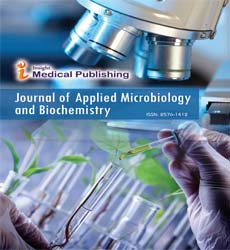ISSN : ISSN: 2576-1412
Journal of Applied Microbiology and Biochemistry
Biochemical Frontiers Study the Future of Drug Development
Sarah Hartman*
Department of Microbiology, Iowa State University, Ames, USA
- *Corresponding Author:
- Sarah Hartman
Department of Microbiology, Iowa State University, Ames,
USA,
E-mail: hartmans@outlook.com
Received date: July 15, 2024, Manuscript No. IPJAMB-24-19674; Editor assigned date: July 18, 2024, PreQC No. IPJAMB-24-19674 (PQ); Reviewed date: August 01, 2024, QC No. IPJAMB-24-19674; Revised date: August 08, 2024, Manuscript No. IPJAMB-24-19674 (R); Published date: August 15, 2024, DOI: 10.36648/2576-1412.8.4.233
Citation: Hartman S (2024) Biochemical Frontiers Study the Future of Drug Development. J Appl Microbiol Biochem Vol.8 No.4 : 233.
Description
The landscape of drug development is undergoing a dramatic change, fueled by developments in biochemistry, technology and a deeper understanding of biological systems. The ability to manipulate and understand biological molecules has opened up new method for creating targeted therapies, biologics and personalized medicine approaches. The frontiers of biochemistry are reshaping the landscape of drug development, prepare for more effective, personalized and innovative therapies. As we continue to study the intersections of biochemistry, technology and healthcare, the potential for improved patient outcomes and transformative treatments is greater than ever. The future of drug development potential to be a dynamic and exciting field, with biochemistry at its core driving the next generation of therapeutic breakthroughs. Embracing these advancements while addressing the challenges will be essential for realizing the full potential of this discipline in improving global health.
Biochemical drug development
One of the most significant advancements in drug development is the shift toward targeted therapies. These treatments are designed to interact with specific molecular targets associated with diseases, leading to improved efficacy and reduced side effects. For instance, in oncology, targeted therapies such as tyrosine kinase inhibitors and monoclonal antibodies have transformed the treatment landscape for various cancers. Personalized medicine takes this concept further by customize treatments to individual patients based on their genetic makeup and the molecular characteristics of their diseases. Advances in genomics and proteomics allow researchers to identify specific biomarkers that predict treatment response. This shift from a one-size-fits-all approach to individualized therapies is enhancing drug efficacy and minimizing adverse effects. High Throughput Screening (HTS) technologies have revolutionized the early stages of drug discovery. By allowing researchers to rapidly test thousands of compounds against specific biological targets, HTS accelerates the identification of lead candidates for further development. Automated systems and advanced data analysis tools facilitate the screening process, significantly reducing the time and resources required for initial discovery. Moreover, combinatorial chemistry, which involves synthesizing large libraries of compounds, works hand-in-hand with HTS. This approach enables the study of a vast chemical space, increasing the likelihood of identifying potential drug candidates. Biologics, derived from living organisms, represent a rapidly growing class of therapeutics. These products, which include monoclonal antibodies, vaccines and gene therapies, are designed to target specific pathways in the body. Biologics often demonstrate higher specificity and potency compared to traditional small-molecule drugs, making them particularly effective in treating complex diseases such as cancer and autoimmune disorders. Recent advances in recombinant DNA technology and cell culture systems have facilitated the development of biologics. Gene therapy is another frontier in drug development that leverages biochemical techniques to treat genetic disorders by correcting or replacing faulty genes. Advances in delivery methods, such as viral vectors and lipid nanoparticles, have improved the efficacy of gene therapies, enabling targeted delivery to specific tissues. The emergence of CRISPR-Cas9 technology has further accelerated progress in gene editing. This powerful tool allows for precise modifications to the genome, opening new possibilities for treating inherited diseases and certain cancers. By directly correcting genetic mutations, CRISPR-based therapies hold potential for previously untreatable conditions.
Challenges in drug development
While the advancements in biochemistry have prepare for innovative drug development, challenges remain. High failure rates during clinical trials continue to pose significant risks to pharmaceutical companies. Factors such as insufficient understanding of disease mechanisms, variability in patient responses and unexpected side effects often contribute to these failures. To address these issues, researchers are increasingly employing systems biology approaches, which integrate data from genomics, proteomics and metabolomics to build comprehensive models of biological systems. By understanding the complex interactions within these systems, scientists can better predict how drugs will behave in patients and identify potential pitfalls early in the development process. These technologies can analyse vast datasets, identify patterns and predict how new compounds will interact with biological targets. As we look ahead, the future of drug development is filled with exciting possibilities driven by continued advancements in biochemistry and technology. Some potential directions include the integration of multi-omics data (genomics, proteomics and metabolomics) will likely play a vital role in drug development. Digital health technologies, including wearable devices and mobile health applications, are becoming increasingly important in drug development. These tools enable real-time monitoring of patient responses and treatment outcomes, providing valuable data that can inform clinical decisions and enhance drug efficacy. The complexity of modern drug development necessitates collaboration across various disciplines, including biochemistry, molecular biology, engineering and data science. As the world grapples with emerging infectious diseases and antibiotic resistance, there is a pressing need for innovative solutions. Biochemical approaches that target neglected diseases and improve access to essential medicines will be critical in addressing global health challenges.
Open Access Journals
- Aquaculture & Veterinary Science
- Chemistry & Chemical Sciences
- Clinical Sciences
- Engineering
- General Science
- Genetics & Molecular Biology
- Health Care & Nursing
- Immunology & Microbiology
- Materials Science
- Mathematics & Physics
- Medical Sciences
- Neurology & Psychiatry
- Oncology & Cancer Science
- Pharmaceutical Sciences
